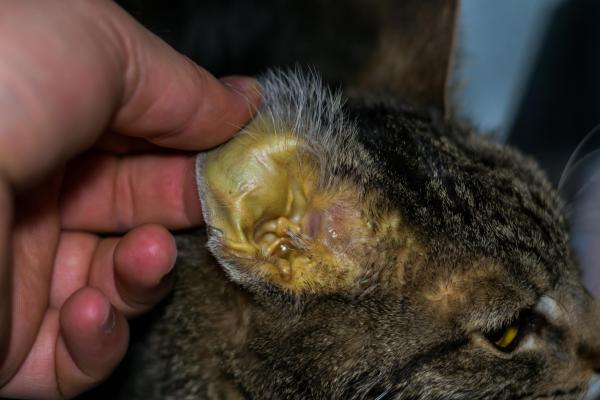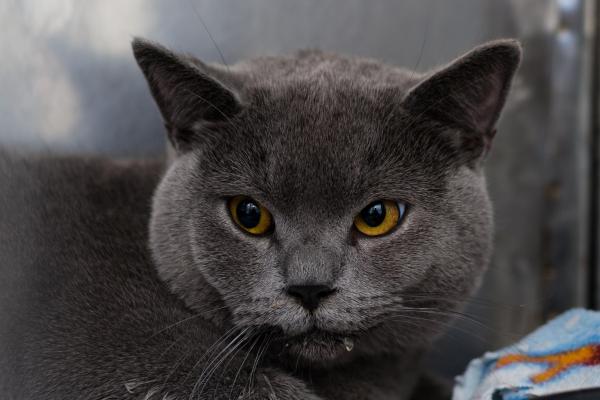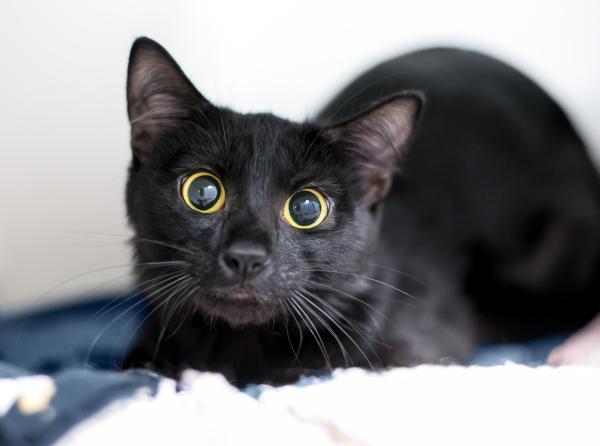Drugs that are Toxic to Cats



See files for Cats
Cats are unique animals with specific metabolic pathways and physiological characteristics that differ from those of other animal species. Therefore, certain medications that are safe for humans or other animals may be toxic to cats and may cause serious or even fatal consequences. Knowing the potential dangers of certain medications can help keep your cat safe and healthy.
The following AnimalWised article lists the 10 most deadly human medications to cats.
- Paracetamol or Acetaminophen
- Ibuprofen
- Naproxen
- Aspirin
- Permethrin
- Fluoxetine
- Venlafaxine
- Pseudoephedrine
- Baclofen
- Vitamin D supplements
- How do you help a cat that has been poisoned?
Paracetamol or Acetaminophen
Paracetamol, also known as acetaminophen, is a commonly used over-the-counter pain reliever and fever reducer. It belongs to a class of drugs called analgesics, which block the production of certain chemicals in the body that cause pain and inflammation.
Paracetamol should never be given to cats because it is extremely toxic. This is because cats have a limited ability to metabolize the drug. In humans, acetaminophen is broken down in the liver and excreted in the urine. In cats, however, a different metabolic pathway is used, which leads to the formation of a toxic compound called NAPQI.
NAPQI can cause severe oxidative damage to cells, leading to red blood cell breakdown, liver damage, and potentially fatal kidney damage. Even small doses of acetaminophen can be toxic to cats, and symptoms of poisoning can occur within hours of ingestion.
Symptoms of acetaminophen poisoning in cats include:
- Vomiting
- Loss of appetite
- Lethargy
- Pale gums
- Difficulty breathing
- Yellowing of the skin and eyes
- Coma
- Death
If you suspect your cat has ingested acetaminophen, be sure to see a veterinarian immediately. Treatment may include inducing vomiting, administering activated charcoal to absorb any remaining toxins, and supportive treatment such as intravenous fluid and oxygen therapy.
Note that acetaminophen can be prescribed to dogs under veterinary supervision, as the drug does not have the same effect in dogs as it does in cats.
Do not miss this other article where we discuss the 5 most common cat poisons and provide information on their symptoms and treatment.

Ibuprofen
Ibuprofen belongs to a class of drugs called nonsteroidal anti-inflammatory drugs (NSAIDs), which are commonly used in humans to relieve pain, fever, and inflammation. Ibuprofen is toxic to cats because they cannot effectively metabolize and excrete the drug, much like acetaminophen.
Ibuprofen can cause adverse effects in cats, including gastrointestinal ulcers, kidney damage and potentially fatal kidney failure. Symptoms of ibuprofen toxicity in cats may include:
- Vomiting
- Diarrhea
- Loss of appetite
- Lethargy
- Abdominal pain
Ibuprofen poisoning in cats can be difficult to treat, even at low doses. Early intervention can improve the chances of a positive outcome for your cat.
Naproxen
Naproxen, sold under the brand name Aleve, is also a nonsteroidal anti-inflammatory drug (NSAID) used to treat pain, inflammation, and fever in humans.
Like other NSAIDs, naproxen is toxic to cats because they are unable to effectively metabolize and excrete the drug. Naproxen can cause serious gastrointestinal ulcers in cats, as well as kidney damage that can lead to kidney failure. Symptoms of naproxen toxicity in cats are the same as with ibuprofen.
Aspirin
Aspirin, also known as acetylsalicylic acid (ASA), is a nonsteroidal anti-inflammatory drug (NSAID) used to relieve pain, inflammation, and fever in humans. It works by blocking the production of certain chemicals in the body that cause pain and inflammation, such as prostaglandins.
Aspirin is toxic to cats because they have a limited ability to metabolize and eliminate the drug. When cats ingest aspirin, it can cause severe gastrointestinal ulcers, kidney damage, and potentially fatal bleeding disorders. Even small doses of aspirin can be toxic to cats, and symptoms of poisoning can occur as soon as one hour after ingestion.
Symptoms of aspirin poisoning in cats may include:
- Vomiting
- Loss of appetite
- Lethargy
- Pale gums
- Rapid breathing
- Increased heart rate
- Rapid and involuntary eye movements
- Seizures
In severe cases, aspirin toxicity can lead to coma, seizures, and death.
If you suspect your cat has ingested aspirin, it is important to seek immediate veterinary attention. Treatment may involve inducing vomiting, administering activated charcoal to absorb any remaining toxins, and providing supportive care such as intravenous fluids and medications to protect the stomach and prevent bleeding disorders.

Permethrin
Permethrin is an insecticide found in various antiparasitic products for dogs, either in pipette, shampoo, or spray form. However, it is highly toxic to cats because they lack the necessary enzymes to break down the chemical efficiently.
As a result, it can accumulate in a cat's body, leading to neurological symptoms such as:
- Tremors
- Seizures
- Death
Even small amounts of concentrated permethrin can cause severe and fatal poisoning in cats. Use only treatments that are approved for cats, as these do not contain amounts of permethrin toxic to cats.
In households with dogs and cats, use spot-on products that do not contain permethrin to avoid accidental exposure, or keep pets separated until the dog's treatment dries. Separation prevents pets from grooming each other or even sleeping next to each other, which could lead to poisoning.
Fluoxetine
Fluoxetine is a drug commonly known as Prozac and belongs to a class of drugs called selective serotonin reuptake inhibitors (SSRIs). It is mainly used to treat depression, anxiety, and other mental health conditions.
While fluoxetine is generally considered safe for humans and dogs, it can be toxic to cats. This is because cats have a slower metabolism and a lower ability to eliminate the drug from their bodies compared to humans and dogs. As a result, fluoxetine can accumulate in a cat's body and cause serious adverse effects.
Symptoms of fluoxetine toxicity in cats may include:
- Agitation
- Vocalizations
- Tremors
- Seizures
- Increased body temperature
- Palpitations
- Death
If you suspect that your cat has ingested fluoxetine, it is important that you seek immediate veterinary attention.
Venlafaxine
Venlafaxine, sold under the brand name Effexor, is also an antidepressant that belongs to a class of medications called serotonin-norepinephrine reuptake inhibitors (SNRIs).
Venlafaxine can be toxic to cats when they take it because they lack certain enzymes needed to break down the drug. This may lead to accumulation of the drug in the cat's system and cause adverse effects like those of Prozak.
To avoid accidental exposure, it is important to keep medications safely out of reach of pets and never administer human medications to pets without first consulting a veterinarian.
Pseudoephedrine
Pseudoephedrine is a drug that belongs to a class of drugs called sympathomimetic amines. It is usually used as a decongestant for the nose, and can also be used in combination with other medications to treat cold and allergy symptoms.
Due to certain enzyme deficiencies, pseudoephedrine can be toxic to cats if ingested. If the drug accumulates in the cat's system, it can cause:
- Agitation
- Tremors
- Seizures
- Increased heart rate
If left untreated, it can also cause death.

Baclofen
Baclofen is a drug that belongs to a class of medicines called muscle relaxants. It is commonly used in people to treat muscle spasms and other conditions such as multiple sclerosis and spinal cord injuries.
Ingestion of baclofen in cats results in a picture of poisoning characterized by the following symptoms in the central nervous system:
- Depression
- Lethargy
- Weakness
- Vomiting
Like pseudoephedrine, Baclofen can cause death if left untreated.
Vitamin D supplements
Vitamin D is an essential nutrient that plays an important role in maintaining healthy bones, muscles, and overall health in humans and animals. However, excessive amounts of vitamin D, as found in certain supplements, can be toxic to cats.
Cats are more susceptible to vitamin D toxicity than other animals because they lack certain enzymes needed to break down and eliminate excessive amounts of vitamin D from their bodies. Excessive intake of vitamin D can lead to an accumulation of calcium in the blood, which can cause damage to the kidneys, heart, and other organs. This manifests in the following symptoms:
- Weakness and depression
- Bloody vomiting and bloody stools.
- Increased water consumption and volume on urine
- Anorexia.
- Hypersalivation
- Tremor
- Seizures
Poisoning often occurs when cats ingest rat and mouse poisons (rodenticides) containing cholecalciferol, or supplements containing either form of vitamin D.
Not only that, but many topical psoriasis medications contain potent amounts of vitamin D and poisoning can occur if cats lick the cream off another person's skin or directly from the tube of product.
How do you help a cat that has been poisoned?
If you suspect that your cat has been poisoned, it is important to act quickly and see a veterinarian immediately. Time is of the essence when it comes to poisoning. Delaying treatment can have serious or even life-threatening consequences.
Here are some steps you can take if you suspect your cat has been poisoned:
- Contact your veterinarian or a local emergency veterinary hospital immediately. They may ask you to bring your cat in for immediate treatment or give you advice on how to proceed.
- If possible, identify the substance your cat may have come in contact with. This may help the veterinarian determine the appropriate treatment.
- Do not attempt to induce vomiting or administer medication to your cat without first consulting a veterinarian, as this can sometimes make the situation worse.
- If you have information about the substance your cat was exposed to, bring the package or container with you to the veterinarian's office. This can help the veterinarian identify the toxic substance and determine the appropriate treatment.
- Monitor your cat closely for changes in behavior, appetite or physical symptoms and report any new developments to the veterinarian immediately.
To ensure your cat's safety and reduce the risk of poisoning, make sure to keep household chemicals, medications, and other toxic substances in a safe place out of your cat's reach.
Learn more about what to do by reading this other article about poisoning in cats, including symptoms and first aid measures.
This article is purely informative. AnimalWised does not have the authority to prescribe any veterinary treatment or create a diagnosis. We invite you to take your pet to the veterinarian if they are suffering from any condition or pain.
If you want to read similar articles to Drugs that are Toxic to Cats, we recommend you visit our Medicine category.
- Noval, Y. (2017). Toxicology in domestic cats (Felis catus). University of Applied and Environmental Sciences UCDA
- Safdar A.; McLean, MK. (2012). Toxicology of Frequently Encountered Nonsteroidal Anti-Inflammatory Drugs in Dogs and Cats . Veterinary Clinics of North America: Small Animal Practice, 42(2): 289-306.








